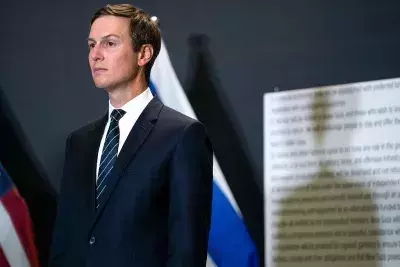
Jared Kushner has once again stepped into a pivotal diplomatic role, summoned by President Trump to aid in securing a ceasefire in Gaza. This return to public service follows a period where Kushner had transitioned back to the private sector, accumulating significant foreign investments through connections established during his initial tenure at the White House. His involvement highlights the complex interplay between personal relationships, business interests, and high-stakes international negotiations.
Kushner's renewed engagement has sparked a debate regarding the ethical implications of his dual role. Having previously played a key part in the Abraham Accords, which normalized relations between Israel and several Arab nations, his firm, Affinity Partners, subsequently attracted billions in investments from these same governments. Critics, including former U.S. ambassador Daniel Shapiro, question the propriety of conducting diplomacy with nations that are simultaneously investing in one's private enterprises, citing potential conflicts of interest. Nevertheless, proponents suggest that these established relationships are precisely what enable effective negotiation and rapid conflict resolution, as demonstrated by the recent ceasefire efforts.
Despite the ethical scrutiny, both the White House and Kushner defend his involvement, asserting that his extensive network and understanding of the region are invaluable assets. Senior administration officials underscore his critical contribution to finalizing the peace deal and fostering dialogue. Kushner himself views what others might perceive as conflicts of interest as vital experience and trusted relationships, indispensable for achieving diplomatic breakthroughs like the recent release of hostages. This perspective emphasizes that in regions where political, business, and family ties are deeply interwoven, a figure with such ingrained connections can uniquely navigate sensitive negotiations.
In an increasingly interconnected world, the boundaries between diplomacy, personal influence, and economic ventures are often blurred. While the pursuit of peace and stability demands innovative approaches and leverages all available resources, it also necessitates a transparent and ethical framework to maintain public trust and ensure that national interests are paramount. The case of Jared Kushner serves as a powerful reminder of these complex considerations, challenging us to weigh the efficacy of leveraging personal connections against the imperative of upholding strict ethical standards in international relations.
